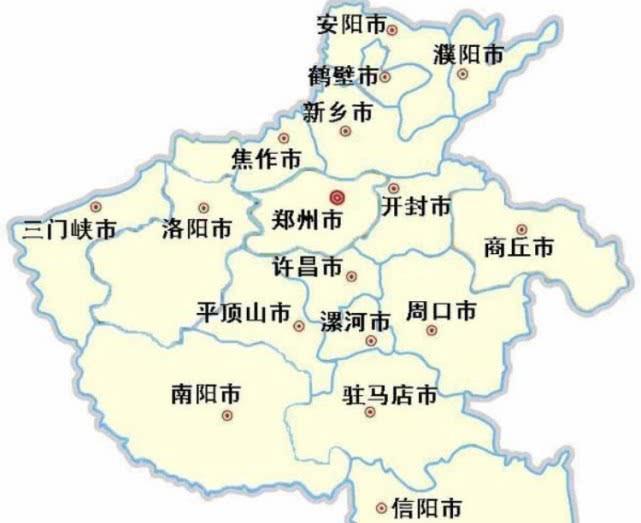Why is Henan Province, which is located in the hinterland of the Central Plains, called "Henan"? The reason is simple, because most of the area is located south of the Yellow River; although the name is unremarkable, it has been the core area of the Central Plains since ancient times, and it has the reputation of "Zhongzhou" of Kyushu; it spans the Huanghuai Great Plain, so it is also known as the "Central Plains".
This large province in the Central Plains, which has a long history and rich culture, has played an important role in the course of China's history for thousands of years. Therefore, some people say: "A chinese history, half in Henan", this sentence is interpreted from another level as how far the history of Chinese civilization is, how far away the history of Henan is. Even though Henan is an important birthplace of Chinese civilization, is such a statement a bit exaggerated?

Map of Henan
The reason why Henan has become a condensation of the essence of Chinese history is mainly manifested in the following aspects. First: Henan gave birth to the Chinese nation and Chinese civilization. According to archaeological findings, primitive people have appeared in Henan about 500,000 years ago; about 100,000 years ago, the Lu people who already had intelligence were also from Henan. Therefore, one of the ancestors of ancient China flourished in Henan, Pangu opened the heavens, Nuwa created people, and the ancestors of the human roots of the Chinese nation all originated from Henan.
9,000 years ago, the ancestors of Henan opened the precedent of primitive agriculture and animal husbandry here; 7,000 years ago, handicraft industries such as copper, textile, winemaking, and jade began to develop in Henan; 5,000 years ago, the emperor established the earliest prototype of the Chinese state in Henan, "There is a bear country"; in the 21st century BC, China's first complete state, the Xia Dynasty, was established here, to some extent, the development history of Henan is indeed the birth history of China.
Henan Jiaozuo beautiful scenery
Second: Many ancient Chinese dynasties built their capital in Henan, which has been a political stage since ancient times. The ancients Zeng Yun "won the Central Plains to win the world", located in Henan, the belly of Kyushu, has always been a big stage. From ancient times to the present, there have been more than 20 dynasties in this land.
Jiandu, one of the eight ancient capitals of ancient China, from Henan", "Kaifeng, Luoyang, Zhengzhou, Anyang" occupies four of them; in addition, 11 cities in Henan, such as Xuchang, Shangqiu, Nanyang, and Dengzhou, have served as capitals successively. Here not only is there the densest group of ancient capitals in China, but many battles to rewrite China's history have also been fought from Henan, giving birth to the Battle of Mingtiao of the Shang Dynasty, the Meeting of Shichi in the Warring States Period, the Chen Qiao Mutiny of Zhao Kuangyin, and this political event has continuously rewritten the glorious history of China's feudal society.
Pei Li Gang Ruins
Third: Henan is the highest highland of ancient Chinese agricultural civilization and the core area of economic development. China has been a country of agriculture since ancient times, located in Henan in the Yellow River Basin, as early as the Pei Ligang culture period in front of 9,000, has begun to cultivate grain extensively; iron agricultural tools and bronze tools used for farming in ancient times were also born in Henan. In order to improve the conditions of agricultural production and promote the development of agriculture, many ancient agricultural works such as "Qi Min Zhi Shu" were born in Henan.
Qi min want to be skilled
As early as 8,000 years ago, Henan has already seen pottery, textile and winemaking; during the Han and Tang Dynasties, Henan was an important iron smelting base and silk weaving base in the country. According to historians, the earliest commodity trading market in China is today's Shangqiu Vulcan Platform, and the reason why people who do business are called "merchants" and "business" is related to the Shangqiu Shang tribe.
Combining the above aspects, "a Chinese history, half in Henan" does have its own truth, and the glorious history of Henan, to a certain extent, can indeed represent half of China's history.